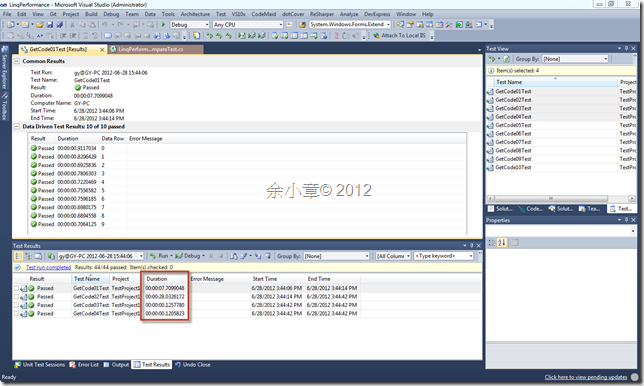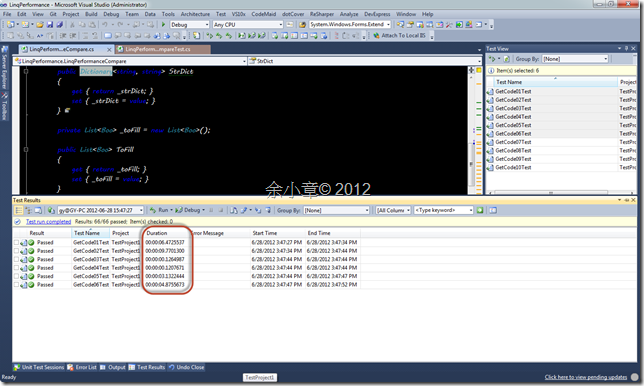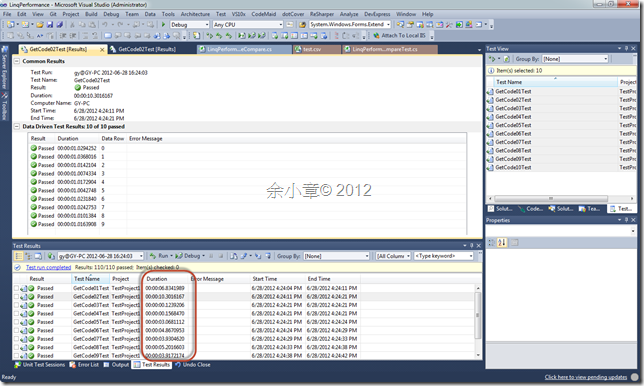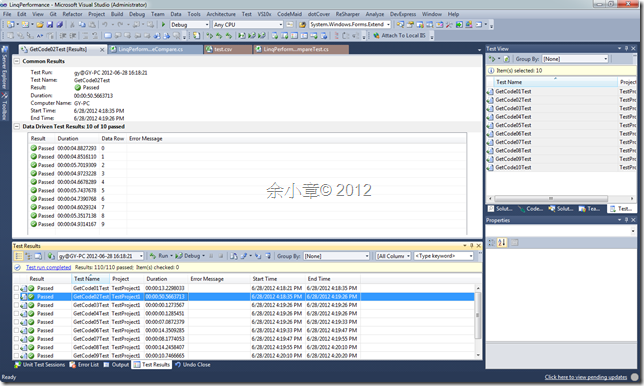[C#.NET][LINQ] LINQ查詢效能比較
相信有拜讀黑大的 當心LINQ搜尋的效能陷阱 文章的人,對於Linq的效能上的陷阱,就應該要更加的小心才是。
我把黑大的Code搬到可以執行單元測試的類別裡,我想測試 Single跟First的差異,想試看看能否為Linq平反一下
public class LinqPerformanceCompare
{
private static readonly int MAX_NO = 100;
private int _time = 500;
public int Time
{
get { return _time; }
set { _time = value; }
}
private List<Boo> _pool = new List<Boo>();
public List<Boo> Pool
{
get { return _pool; }
set { _pool = value; }
}
private List<Boo> _shuffled;
public List<Boo> Shuffled
{
get { return _shuffled; }
set { _shuffled = value; }
}
private Dictionary<string, Boo> _dict;
public Dictionary<string, Boo> Dict
{
get { return _dict; }
set { _dict = value; }
}
private Dictionary<string, string> _strDict;
public Dictionary<string, string> StrDict
{
get { return _strDict; }
set { _strDict = value; }
}
private List<Boo> _toFill = new List<Boo>();
public List<Boo> ToFill
{
get { return _toFill; }
set { _toFill = value; }
}
public LinqPerformanceCompare()
{
//使用相口同亂數種子確保每次執行之測試資料相同
Random rnd = new Random(9527); //交給你了,9527
//建立大量物件集合
for (int i = 0; i < MAX_NO; i++)
{
for (int j = 0; j < rnd.Next(500, 1000); j++)
{
this.Pool.Add(new Boo()
{
No = i,
SubNo = j,
Code = "C" + rnd.Next(1000).ToString("000")
});
}
}
//打亂排序
this.Shuffled = this.Pool.OrderBy(o => rnd.Next()).ToList();
//建立Dictionary
this.Dict = this.Pool.ToDictionary(
o => string.Format("{0}\t{1}", o.No, o.SubNo),
o => o);
//建立字串Dictionary
this.StrDict = this.Pool.ToDictionary(
o => string.Format("{0}\t{1}", o.No, o.SubNo),
o => o.Code);
//產生TIMES個待查對象
for (int i = 0; i < this.Time; i++)
{
Boo sample = this.Pool[rnd.Next(_pool.Count)];
this.ToFill.Add(new Boo()
{
No = sample.No,
SubNo = sample.SubNo
});
}
}
{
private static readonly int MAX_NO = 100;
private int _time = 500;
public int Time
{
get { return _time; }
set { _time = value; }
}
private List<Boo> _pool = new List<Boo>();
public List<Boo> Pool
{
get { return _pool; }
set { _pool = value; }
}
private List<Boo> _shuffled;
public List<Boo> Shuffled
{
get { return _shuffled; }
set { _shuffled = value; }
}
private Dictionary<string, Boo> _dict;
public Dictionary<string, Boo> Dict
{
get { return _dict; }
set { _dict = value; }
}
private Dictionary<string, string> _strDict;
public Dictionary<string, string> StrDict
{
get { return _strDict; }
set { _strDict = value; }
}
private List<Boo> _toFill = new List<Boo>();
public List<Boo> ToFill
{
get { return _toFill; }
set { _toFill = value; }
}
public LinqPerformanceCompare()
{
//使用相口同亂數種子確保每次執行之測試資料相同
Random rnd = new Random(9527); //交給你了,9527
//建立大量物件集合
for (int i = 0; i < MAX_NO; i++)
{
for (int j = 0; j < rnd.Next(500, 1000); j++)
{
this.Pool.Add(new Boo()
{
No = i,
SubNo = j,
Code = "C" + rnd.Next(1000).ToString("000")
});
}
}
//打亂排序
this.Shuffled = this.Pool.OrderBy(o => rnd.Next()).ToList();
//建立Dictionary
this.Dict = this.Pool.ToDictionary(
o => string.Format("{0}\t{1}", o.No, o.SubNo),
o => o);
//建立字串Dictionary
this.StrDict = this.Pool.ToDictionary(
o => string.Format("{0}\t{1}", o.No, o.SubNo),
o => o.Code);
//產生TIMES個待查對象
for (int i = 0; i < this.Time; i++)
{
Boo sample = this.Pool[rnd.Next(_pool.Count)];
this.ToFill.Add(new Boo()
{
No = sample.No,
SubNo = sample.SubNo
});
}
}
public string GetCode1(int n, int sn)
{
return this.Pool.Single(o => o.No == n && o.SubNo == sn).Code;
}
public string GetCode2(int n, int sn)
{
return this.Shuffled.Single(o => o.No == n && o.SubNo == sn).Code;
}
public string GetCode3(int n, int sn)
{
return this.Dict[string.Format("{0}\t{1}", n, sn)].Code;
}
public string GetCode4(int n, int sn)
{
return this.StrDict[string.Format("{0}\t{1}", n, sn)];
}
}
單元測試,為了觀察每次查詢的時間,我利用驅動測試來增加測試次數並觀察每一次的測試結果
public void GetCode04Test()
{
var count = TestContext.DataRow[0].ToString();
for (int j = 0; j < _target.Time; j++)
{
var boo = _target.ToFill[j];
boo.Code = _target.GetCode5(boo.No, boo.SubNo);
}
//挑選三個抽樣檢查執行結果是否一致
var expected = _target.ToFill;
var actual = new string[] { "C183", "C436", "C560" };
Assert.AreEqual(expected[1].Code, actual[0]);
Assert.AreEqual(expected[10].Code, actual[1]);
Assert.AreEqual(expected[50].Code, actual[2]);
}
測試文件長這樣:

先測試搬過來的結果跟黑大的比較一下,証明類別沒有寫錯,很顯然結果就是跟黑大講的一樣,Linq跟Dictionary查詢效能差很多。

再新加了兩個調用First的方法
public string GetCode5(int n, int sn)
{
return this.Pool.First(o => o.No == n && o.SubNo == sn).Code;
}
public string GetCode6(int n, int sn)
{
return this.Shuffled.First(o => o.No == n && o.SubNo == sn).Code;
}
大夥兒再比一次,First 執行出來的結果比 Single 看起來好多了,但跟 Dictionary 比還是差很多

用PLINQ亂入一下
public string GetCode7(int n, int sn)
{
return this.Pool.AsParallel().Single(o => o.No == n && o.SubNo == sn).Code;
}
public string GetCode8(int n, int sn)
{
return this.Shuffled.AsParallel().Single(o => o.No == n && o.SubNo == sn).Code;
}
public string GetCode9(int n, int sn)
{
return this.Pool.AsParallel().First(o => o.No == n && o.SubNo == sn).Code;
}
public string GetCode10(int n, int sn)
{
return this.Shuffled.AsParallel().First(o => o.No == n && o.SubNo == sn).Code;
}
平行運算在我電腦看來也沒太大差異。認識 PLINQ 中的加速

把Time提升到1000再比一次,仍是相差無幾

結論仍是引用黑大講的:"依賴LINQ的Where查詢在大量資料中反覆查詢,很容易形成效能瓶頸。面對類似需求,可透過ToDictionary()簡單轉換成Dictionary,即可獲得可觀的效能提升。"
範例下載:
若有謬誤,煩請告知,新手發帖請多包涵
Microsoft MVP Award 2010~2017 C# 第四季
Microsoft MVP Award 2018~2022 .NET